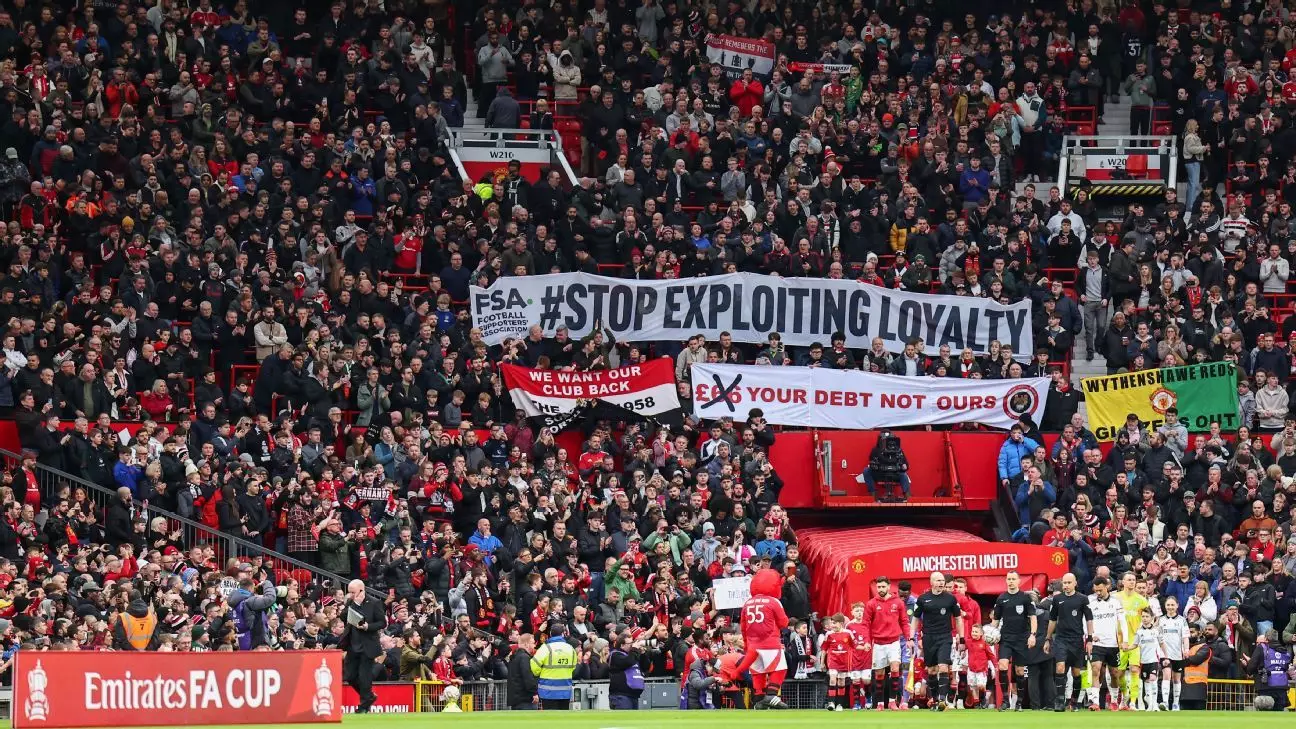In recent months, Manchester United has found itself engulfed in a swell of discontent arising from the club’s ownership and the resulting financial instability. This distress has coalesced around a crucial protest effort spearheaded by “The 1958,” one of the club’s most vocal supporter groups. The upcoming match against Arsenal at Old Trafford is not merely a fixture on the sporting calendar; it represents an urgent call to action for fans deeply invested not only in their team’s success on the pitch but also in the soul of the institution they cherish.
The financial statistics emerging from United reveal a grim portrait: a staggering net loss of $144 million, escalating debt, and a significant compensation expenditure reached during managerial changes. The Glazer family’s ownership has come under intense scrutiny, with fans advocating for accountability. The increasingly dire circumstances surrounding the club serve not just as fodder for statistical analysis; they highlight a fanbase that feels disillusioned with a family whose interests seem more aligned with profit than the legacy of the club itself.
The Glazer family’s acquisition of Manchester United in 2005 initiated a tumultuous era characterized by heavy debt. Over £500 million was added to the club’s financial burden following their leveraged buyout, transforming a once debt-free club into a corporation struggling under the weight of its obligations. This deterioration is not simply a matter of numbers; it reflects systemic mismanagement and a disconnection between the decision-makers and the very essence of what Manchester United represents.
Fans of “The 1958” have encapsulated this sentiment perfectly in their recent message: “The club is slowly dying before our eyes.” Such stark language underscores the emotional weight of the current predicament. For supporters who once reveled in the glory of their team, witnessing its decline has been nothing short of heartbreaking. The nostalgia associated with Sir Matt Busby’s era—when the club could do no wrong—stands in stark contrast to the hardships faced today. The pain is palpable, and it is driving fans to rally together, fueled by a profound sense of urgency.
The financial armageddon facing Manchester United extends beyond mere deficits. The Glazers’ business strategies have led to a considerable increase in ticket prices, forcing loyal fans to question their ability to support the team. The recent policy to standardize ticket prices at £66, irrespective of age, exemplifies a corporate approach that disregards the longstanding traditions of fan culture. Such decisions fuel the narrative of fans being treated as mere revenue sources rather than cherished supporters of a storied team.
Moreover, the reported redundancies and the club’s attempts at cost-cutting further exacerbate an already tense environment. Rubén Amorim’s arrival as manager has failed to ignite any meaningful revival in the team’s form. Fans are not only grappling with poor performances but also with a broader existential threat to the very culture that has defined their passion for decades. The prospect of further decline looms large, and the call for protests symbolizes a collective resistance against ongoing injustices perpetrated by ownership.
As uncertainty continues to swirl around Old Trafford, the call to don black attire for the upcoming protest is more than an act of defiance; it signifies a communal mourning of what has been lost and a proactive stance toward reclaiming the club’s legacy. The march organized by “The 1958” aims to galvanize fans not only to voice their opposition but to unify against what many perceive as an assault on the values that underpin Manchester United’s identity.
This growing sense of solidarity among fans reflects a passionate plea for change that transcends the pitch. The Glazers may have financial resources, but the resilience and dedication of a united fanbase wield a form of power that cannot be underestimated. Fans will not stand idly by as the fabric of their club continues to unravel.
By coming together in protest and demanding accountability from ownership, Manchester United supporters are channeling their frustration into a movement that seeks to restore pride and integrity to their beloved institution. The stakes have never been higher, and the message is clear: the soul of Manchester United is worth fighting for.

